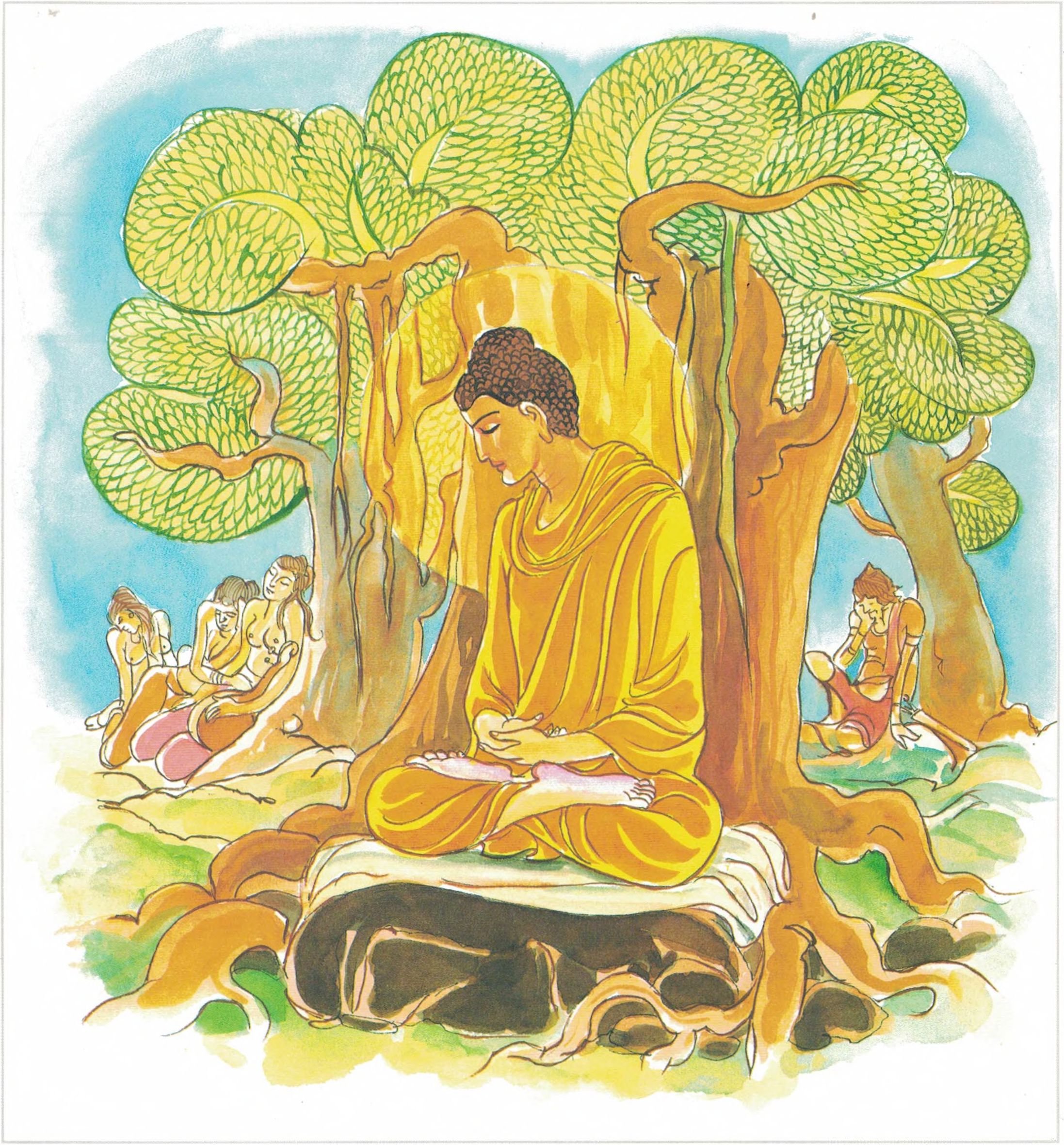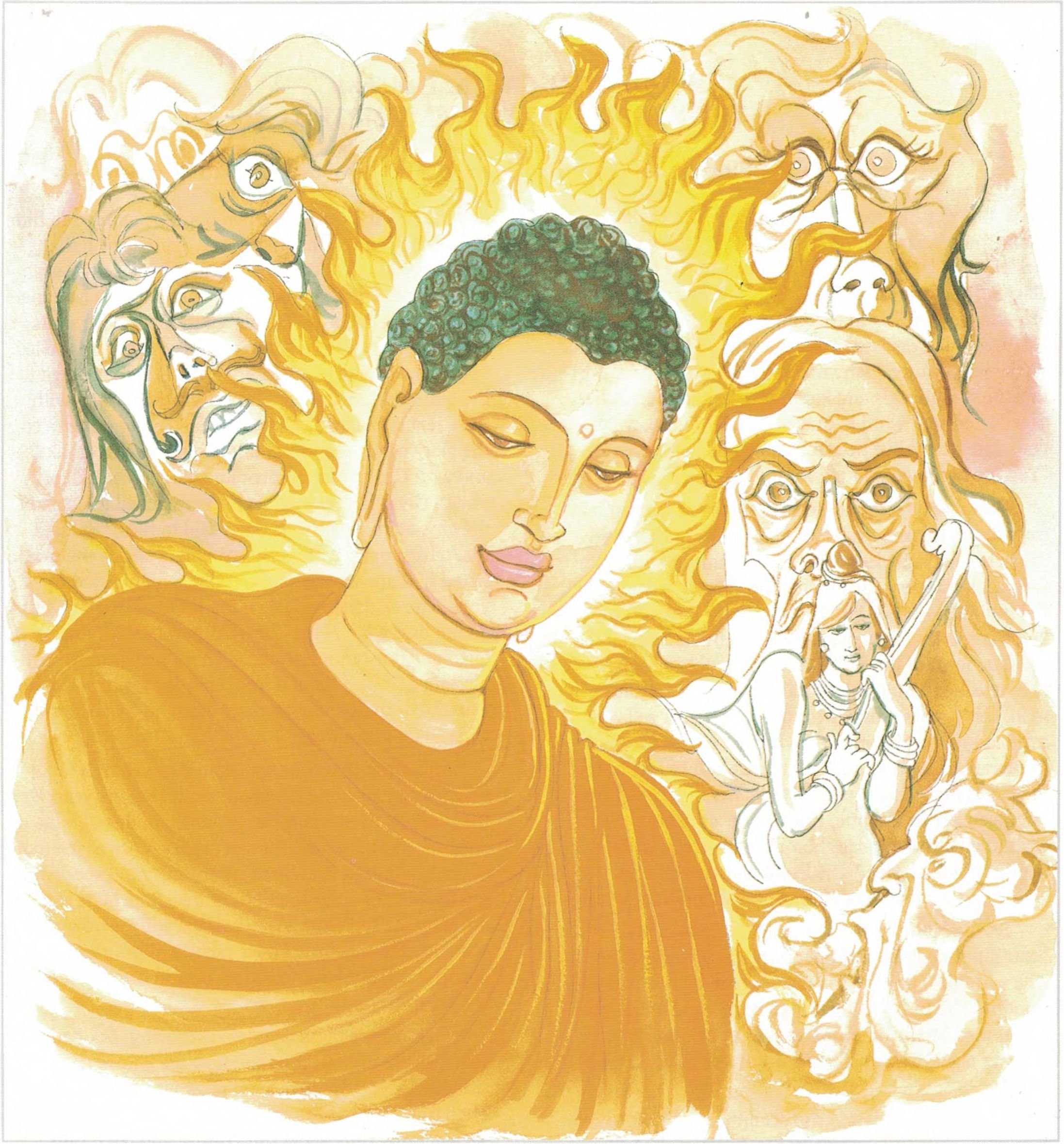Dhammapada (Illustrated)
by Ven. Weagoda Sarada Maha Thero | 1993 | 341,201 words | ISBN-10: 9810049382 | ISBN-13: 9789810049386
This page describes The Story of the Three Daughters of Mara which is verse 179-180 of the English translation of the Dhammapada which forms a part of the Sutta Pitaka of the Buddhist canon of literature. Presenting the fundamental basics of the Buddhist way of life, the Dhammapada is a collection of 423 stanzas. This verse 179-180 is part of the Buddha Vagga (The Buddha) and the moral of the story is “The triumph of Buddhahood is infallible, irreversible and unassailable” (first part only).
Verse 179-180 - The Story of the Three Daughters of Māra
Pali text, illustration and English translation of Dhammapada verse 179-180:
yassa jitaṃ nāvajīyati jitam'assa no yāti koci loke |
taṃ buddham anantagocaraṃ apadaṃ kena padena nessatha || 179 ||
yassa jālinī visattikā taṇhā natthi kuhiñci netave |
taṃ buddham anantagocaraṃ apadaṃ kena padena nessatha || 180 ||
179. That Buddha traceless of infinite range whose victory none may e’er undo, whose vanquished follow to no world, then by which track will you trace him?
180. That Buddha traceless of infinite range in whom’s no entangling craving and no ensnaring, not anywhere leading, then by which track will you trace him?
 The triumph of Buddhahood is infallible, irreversible and unassailable. |
 In Buddhahood is all craving routed. There is neither trapping nor being trapped. |
The Story of the Three Daughters of Māra
While residing near the Bodhi-tree, the Buddha spoke these verses, with reference to the three daughters of Māra. He repeated these verses to the brāhmin Māgandiya of the kingdom of Kurus. A brāhmin named Māgandiya, dwelling in the kingdom of the Kurus, had a daughter likewise named Māgandiya, who possessed surpassing beauty. Many men of wealth and social position, both brāhmins and khattiyas, desired to have her as wife and sent word to Māgandiya, saying, “Give us your daughter.” But he refused them all alike, saying, “You are not good enough for my daughter.”
Now one day, as the Buddha surveyed the world at early dawn, he perceived that Māgandiya had entered the net of his knowledge. Now the brāhmin tended the fire regularly every day outside the village; accordingly the Buddha took bowl and robe early in the morning and went to that very place. The brāhmin surveyed the majestic form of the Buddha and thought to himself, “There is no man in this world comparable to this man; this man is suitable for my daughter; I will give my daughter to this man.” So he said to the Buddha, “Venerable, I have a single daughter, and I have looked in vain to find a man suitable to be her husband. I have not given her to any one. But you are suitable for her. I wish to give you my daughter in marriage; wait right here until I fetch her.” The Buddha listened to his words, but expressed neither approval nor disapproval.
So the brāhmin had his daughter arrayed in her beautiful garments, and taking the daughter and his wife with him, went to the place where he had met the Buddha. The Buddha, instead of remaining in the place mentioned by the brāhmin, moved away and stood in another place, leaving a footprint where he had stood before.
The brāhmin’s wife, who accompanied him, asked him, “Where is this man?” The brāhmin replied, “I said to him, ‘Remain in this place.’” Looking around, the brāhmin saw the footprint and showed it to his wife, saying, “This is his footprint.” Now the brāhmin’s wife was familiar with the verses relating to signs and immediately said to the brāhmin, “Brāhmin, this is no footprint of one who follows the five lusts.” The brāhmin replied, “Wife, you always see a crocodile in a drop of water. When I said to that monk, ‘I will give you my daughter,’ he accepted my proposal.” The brāhmin’s wife replied, “Brāhmin, you may say what you like, but this is the footprint only of one who is free from lust.” Then said the brāhmin to his wife, “Wife, do not rattle on thus; come with me in silence.” Advancing a little way, he saw the Buddha, whereupon he pointed to him and said, “There is the man!” And approaching the Buddha, he said, “Venerable, I will give you my daughter to wife.” The Buddha, instead of saying, “I have no need of your daughter,” said, “Brāhmin, I have something to say to you; listen to me.” The brāhmin replied, “Say it; I will listen.” Thereupon the Buddha related to the brāhmin the story of his past life, beginning with the Great Retirement. The Buddha, having renounced the glory of dominion, mounted his horse Kanthaka, and with Channa for companionship, proceeded forth on the Great Retirement. As he approached the gate of the city, Māra, who stood near, said to him, “Siddhattha, return upon your way; seven days hence the magic wheel of a universal monarch will be manifested to you.” The Buddha replied, I too know that, Māra, but I do not desire it.” “Then for what purpose are you going forth on your renunciation?” “That I may acquire omniscience.” “Well then, if from this day forth, you think a lustful or malevolent or cruel thought, I shall know what to do in your case.”
And, from that time on, Māra pursued him for seven years, awaiting his opportunity. For six years the Buddha practiced austerities, and when, through his individual effort, he had attained omniscience at the foot of the Bodhi-tree (Goatherd’s Banyan-tree) experiencing the bliss of emancipation. At that time Māra sat down by the highway, overwhelmed with sorrow at the thought, “All this time I have pursued him, seeking my opportunity, but have found no flaw in him; now he has escaped from my power.”
Now Māra’s three daughters, Craving, Sex and Passion, asked him, “Dear father, why are you so downcast and depressed?” He told them what was the matter. Then they said to him, “Dear father, be not disturbed; we will bring him under our control and fetch him hither.” Approaching the Buddha, they said to him, “We would be your humble slaves.” The Buddha paid no attention to their words, nor did he so much as open his eyes and look at them. Said the daughters of Māra again, “Many and various are the tastes of men. Some like maidens, others like women in the prime of life, others like women who have reached mid-life, while still others like women who have passed mid-life. We will tempt him in various forms. So one after another, they assumed the forms of women of various ages, creating by superhuman power, each a hundred female forms, and said to him, “We would be your humble slaves.”
The Buddha said to them, “Depart; what do you see, that you strive thus? Such actions as these should be performed before those who have not released themselves of the lusts and other evil passions. The Tathāgata has rid himself of the lusts and other evil passions. Why would you try to bring me into your control?” When the Buddha had completed his biographical discourse, he said, “Māgandiya, when long ago, I beheld these three daughters of Māra, possessed of bodies comparable to gold, free from phlegm and the other bodily impurities, even then I had no desire for sensual pleasures. But as for your daughter’s body, it is a body filled with thirty-two impurities of the body as if it were a vessel filled with impurities, but painted beautifully outside.”
Explanatory Translation (Verse 179)
yassa jitaṃ loke nā avajīyati assa jitaṃ koci no yāti
anantagocaraṃ apadaṃ taṃ Buddhaṃ kena padena nessatha
yassa: by that Enlightened One; jitaṃ [jita]: what was conquered; loke nā avajīyati: can never become conquered, in this world; assa: by that Buddha; jitaṃ [jita]: what has been conquered (in this world); koci: by any other defilements; no yāti: will not be followed; anantagocaraṃ [anantagocara]: his area of focus is endless; apadaṃ [apada]: he has no path left; taṃ Buddhaṃ [Buddha]: that Enlightened One; kena padena: by what path; nessatha: can you pursue?
The Buddha’s victory has not been won incorrectly. No one can turn Buddha’s victory into defeat. Nothing that he has conquered can return, or pursue him, because his conquest is so complete: His ken infinite. In what way can you tempt or ensnare him?
Explanatory Translation (Verse 180)
yassa kuhiñci netave jālinī visattikā taṇhā natthi,
ananta gocaraṃ apadaṃ taṃ Buddhaṃ kena padena nessatha
yassa: that Buddha; kuhiñci netave: to be captured; jālinī: net-like; visattikā: poison-like; taṇhā: craving; natthi: is not found; ananta gocaraṃ [gocara]: whose area of focus is endless; apadaṃ [apada]: who has no roots left; taṃ Buddhaṃ [Buddha]: that Buddha; kena padena: by what means; nessatha: can you tempt?
The Buddha, in whom there is no thirst (tanhā) for grasping to the net that lures, whose ken is infinite, in what way can you lure him away?
Commentary and exegetical material (Verse 179-180)
The Buddha: The Enlightened One. After a stupendous struggle of six strenuous years, in His 35th year, unaided and unguided by any supernatural agency, and solely relying on His own efforts and wisdom, eradicated all defilements, ended the process of grasping, and, realizing things as they truly are, by His own super perceptive knowledge, became the Buddha–the Enlightened One.
Thereafter, he was known as Buddha Gotama, one of a long series of Buddhas that appeared in the past and will appear in the future. He was not born a Buddha, but became a Buddha by His own efforts through a process of voluntary evolution of consciousness. The Pāli term Buddha is derived from bodhi, to be awakened. As He fully experienced the four extraordinary realities and as He arose from the slumbers of unawareness, He underwent a complete transformation from a self-centred being to a literally, and in every sense, selfless non-being or non-person. He not only attained to that state but He also expounded the reality He experienced and enlightened others. He is called a Sammā Sambuddha–a harmoniously Awakened One–to distinguish Him from Pacceka (solitary) Buddhas who only experience the reality but are incapable of enlightening others.
Before His Awakening, He was called a bodhisatta, which means one who is aspiring to attain Buddhahood. Every aspirant to Buddhahood passes through the bodhisatta stage–a period of intensive practice and development of the qualities of generosity, discipline, renunciation, wisdom, energy, endurance, truthfulness, determination, benevolence, and perfect equanimity.
